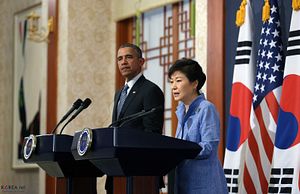“Political correctness” is often used to describe words or policies that intentionally avoid offending disadvantaged groups in a society — or simply upsetting mainstream opinion. From a certain perspective, given the current situation in Northeast Asia, the term may also be adopted to describe South Korea’s difficult but decisive decision over deploying the U.S. Terminal High Altitude Area Defense (THAAD) system.
Putting aside any “moral obligation” to the Seoul-Washington alliance, threats from North Korea’s resolute nuclear tests and missile launches (particularly the fifth nuclear test earlier this month) may have sent a timely “gift” to Park Geun-hye’s administration, which for a time had faced tremendous domestic opposition to THAAD deployment. The “gift” of a nuclear test, provocative though it is, may have helped to justify Park’s determination that no matter the circumstances, national security (or “survival”) overrides economic interests. Therefore, South Korea’s “national survival” and “moral obligation” to its ally can be regarded as the two main rationales for Park’s administration at this particular moment.
In fact, after North Korea’s fifth nuclear test, South Korea’s opposition parties have started to change their attitude. According to South Korean media, the previous tussle between the ruling party and the opposition parties over THAAD deployment has virtually evolved into practical consent after Pyongyang’s latest nuclear test, as the opposition parties realized that the deployment seems to be “inevitable.” There are of course consequences to follow the deployment. South Koreans believe, however, that though they may face certain “reactive measures” (if not retaliation) diplomatically and economically — particularly from China — supporting the THAAD decision is now “politically correct.”
The current sense of “political correctness” surrounding the THAAD deployment is likely here to stay. A political consensus is being reached in South Korea and North Korea will not compromise at this moment. There is a rather natural but ironic logic of “mutual survival” driving military build-ups on both sides of the 38th parallel.
In China’s view, however, no matter how “politically correct” the deployment of THAAD system is, given South Korea’s concerns over its national security and survival, it may eventually open a “Pandora’s Box.” Although this system is absolutely capable of directly imposing a substantial threat to China’s national security, Beijing’s prime concern is that strategic uncertainty will cause a series of unpredictable and maybe unbearable events in the region after the deployment of THAAD in South Korea.
This is not groundless speculation; both China and Russia may need to seriously rethink their military strategies and diplomatic policies. In fact, according to Sputnik, the head of the Russian Foreign Ministry’s Department for Non-Proliferation and Arms Control said that Russia will take U.S. missile system deployment in South Korea into account in its military planning.
Of course, the U.S.-South Korea alliance may take further countermeasures to “take into account” multiple reactions, including those from China and Russia. The question is, like always, where will the cycle end?
































